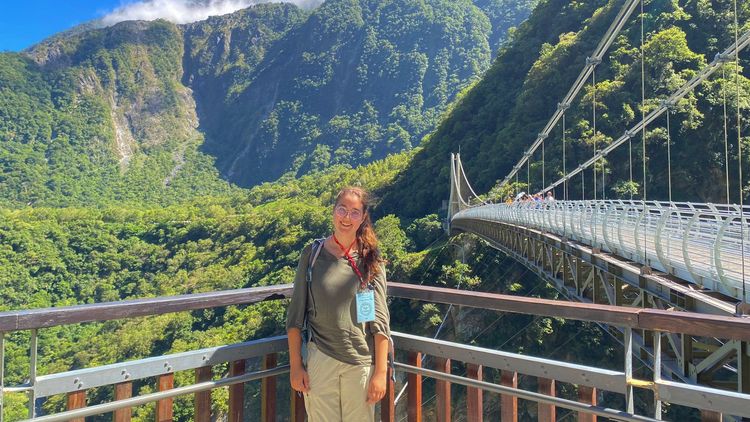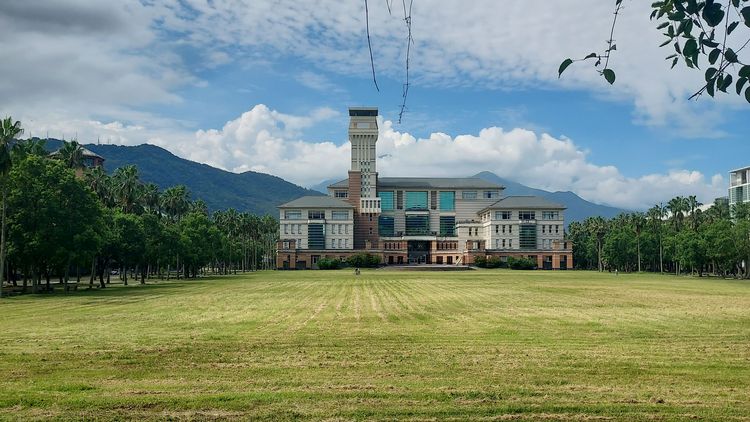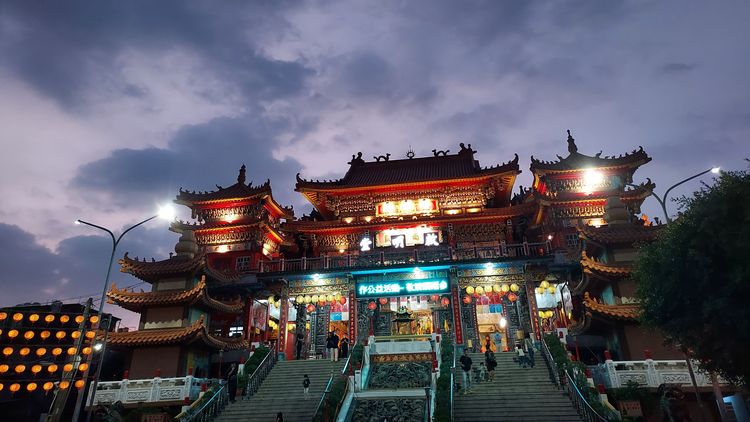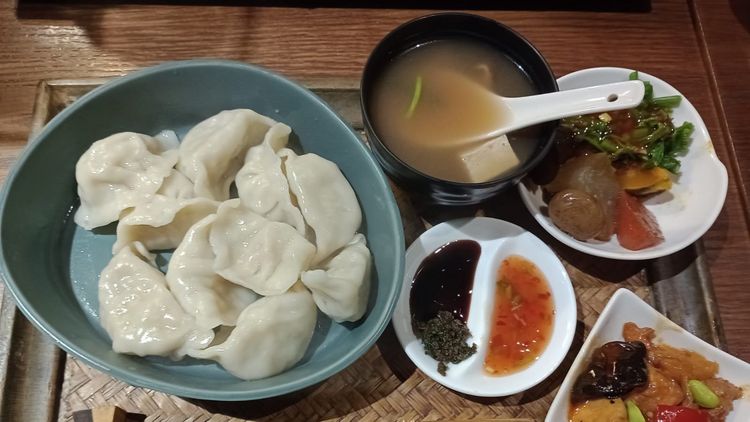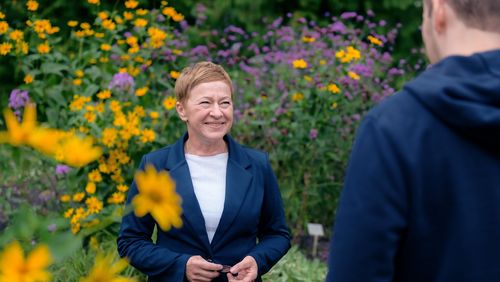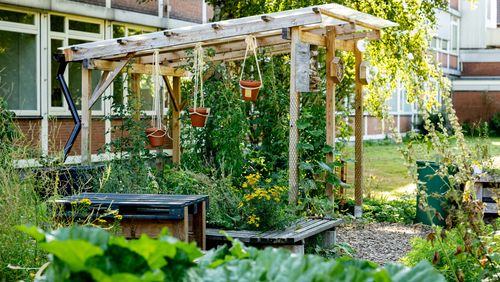Luisa Fischer is studying environmental sciences at the University of Oldenburg and currently spending a semester on the island of Taiwan in the western Pacific. She’s delighted with the interesting courses, the friendly people and the beautiful nature.
When Luisa Fischer is out and about on National Dong Hwa University’s extensive campus in Hualien County, eastern Taiwan, she uses the same mode of transport as when she’s at home in Oldenburg – a bicycle. A Dutch bicycle to be precise, which her Taiwanese buddy partner arranged for her to use during her six-month stay at the university. “There are only a few cars on campus, and scooters and motorbikes are not allowed on most of the roads, so cycling here is very pleasant,” she explains.
The Oldenburg student is also enjoying many other things about living and studying in Taiwan, a mountainous island state in the western Pacific about the size of Baden-Württemberg: “The people are all super friendly and helpful,” she observes. “If you're standing around looking for something, you usually don't even have to ask anyone for help. People offer spontaneously.” There’s a “very relaxed vibe” to everything, says Luisa, who has been in Taiwan since the end of September.
The campus is located around 15 kilometres outside the coastal city of Hualien, which has around 110,000 inhabitants and is surrounded by mountains. For Luisa, the remote location of the university is perfect: “I like it quiet,” she says.
A strong focus on the environment and sustainability
Luisa, who is currently in the seventh semester of her bachelor’s degree programme in Environmental Sciences, decided to spend a semester abroad at the University of Oldenburg's partner institution in Taiwan mainly because of the courses it offers. “There’s a strong focus on the environment and sustainability here, and many of the master’s courses are also taught in English.” Luisa is taking courses in fish ecology, climate change, and sustainability and regional culture, and also doing a beginners’ course in Chinese. “Thanks to the translation apps on my smartphone I can get by without knowing the language, but it’s a challenge to communicate or read signs,” she says, so for her it makes sense to learn the language.
Taking part in the language course was also a prerequisite for her scholarship from the Taiwanese government, which is financing her stay for the most part. “I'm very grateful for this support. It means I can comfortably cover my living costs here,” she says. Although she had worked and saved up some money before her trip, thanks to the scholarship she doesn’t have to count every penny she spends, she explains.
It was Roman Behrens from the University of Oldenburg’s International Office who drew her attention to the possibility of financial support. “Several of our exchange students in Taiwan have already received this kind of scholarship. It’s a really great option since a stay in East Asia is usually quite expensive,” explains Behrens, who is regional coordinator and study abroad advisor for Asia. The University of Oldenburg has been collaborating with National Dong Hwa University since 2018.
The application process was relatively straightforward, says Luisa. The scholarship came with just a few minor requirements such as voluntary work and successful participation in certain study modules. Together with other scholarship holders Luisa took part in two science activity days at a primary school and a secondary school. “That was a lot of fun,” she notes. Through these school visits she gained a deeper insight into Taiwanese culture and also got to know other international students.
Meeting people in the Nature Club
There are plenty of opportunities to make contacts at National Dong Hwa University, including numerous clubs set up by students to pursue common interests. “There’s something for everyone – clubs for tea, coffee, photography, volleyball, swimming and kayaking, to name just a few examples,” says Luisa. She herself has already taken part in several events organised by the Nature Club and the Mountain Club and gone on expeditions to the mountains around Hualien to climb or identify animals. Taiwan has a subtropical to tropical climate, so even in winter daily temperatures can still go up to around 20 degrees Celsius.
Through her seminars and leisure activities Luisa has gained a better understanding of Taiwan’s approach to nature conservation. Ultra-modern and at the same time offering impressive natural beauty, Taiwan has nine national parks which cover 8.6 percent of its total surface area. Anyone wanting to climb its mountains, some of which are almost 4000 metres high, must first apply for a permit,” Luisa explains. Talking about these topics with others and getting to know different views and perspectives is a very enriching aspect of her semester abroad, she says.
In Germany, people mainly hear about Taiwan in connection with the conflict with the People's Republic of China. However, the political situation barely figures in her everyday life, says Luisa. “I was a bit nervous about it before I came,” she admits, “but I haven’t thought about it much since I’ve been here.” However, you can sometimes tell from casual remarks that people care about their identity, their values and democracy, she adds.
Many friends from all over the world
There were a few things it took her a while to adjust to when she first arrived, above all sleeping in a room with four other people. “Sometimes it’s a bit difficult to sleep, because obviously not all your roommates have the same rhythm,” she explains. Nonetheless, she was very happy to have company, especially at the beginning. “The new culture, new language, and lots of new people – it was a bit overwhelming at first,” she admits. But her initial worries soon disappeared, and she has since made many friends from all over the world, including students from countries like Vietnam, Thailand and India who are doing their entire studies in Taiwan.
In Oldenburg too, interest in spending a semester studying in Asia is growing, Roman Behrens observes. “Japan, South Korea and Taiwan are at the top of the list,” he says. So far, National Dong Hwa University is the University of Oldenburg's only exchange partner in Taiwan, but it has two partner universities in South Korea and four in Japan. Anyone wishing to apply for a stay in Asia next year has a couple of months left to do so: applications for 2025 can be submitted in May and June of this year.
This text was first published in the December issue of the university newspaper UNI INFO in December (in German).

